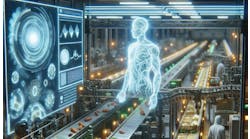At a time when travel is restricted due to COVID-19, Nestlé is expanding the use of augmented reality technology to provide remote support to its production and R&D sites and to connect with suppliers.
Experts across the company and external providers are using remote assistance tools to connect with people at factories and other facilities around the globe. This has raised efficiency across operations and allowed experts to support multiple projects at the same time.
Using tools such as remote desktop, smart glasses, 360-degree cameras and 3D software, specialists can advise on complex tasks without needing to travel to the site.
The technology has been used in projects such as the set-up or redesign of factory lines, vital maintenance work and checking equipment with suppliers.
"Protecting our people is a top priority for Nestlé, something that has been clearly demonstrated time and time again during the COVID-19 crisis," says David Findlay, global head of manufacturing at Nestlé SA. "The remote support approach isn't just a response to COVID-19, though. Going forward, remote assistance will become a new way of working. It will increase speed and efficiency in facilities and reduce travel to Nestlé sites, helping us reduce CO2 emissions across our operations.
"I am extremely proud that our teams have been able to expand our use of remote assistance technology so quickly to ensure we were able to continue to provide technical support," he continues.
"That has kept our factories running smoothly and delivered new investment projects on time."
There are many examples of remote support across Nestlé's factories and R&D facilities. For example, R&D teams in Switzerland helped to remotely renew existing and install new production lines and technologies for a dairy ready-to-drink (RTD) factory in Navanakorn, Thailand. The factory was completed ahead of schedule.
They also supported the installation of a new production line for infant cereals in Shuangcheng, China. Additionally, R&D expert teams in the UK worked with suppliers to remotely redesign and successfully test new confectionery molds for KitKat.
Other examples include maintenance work at factories in Colombia and Ecuador or setting up a new pet food line in the U.S.
Thomas Hauser, head of Nestlé product & technology development, says: "To ensure business continuity, we accelerated the use of remote assistance and augmented reality technologies across our global R&D organization.
"These innovative technologies enabled our experts to provide support to our factories worldwide for critical activities such as the new set-up of production lines, as well as new equipment start-up, helping us to ensure that new product launches were delivered on time to consumers," he says.
Nestlé engineers are continuously scouting for and prototyping emerging technologies. They had already established virtual reality capabilities, and remote guidance had been used with limited scope on several projects.
With restrictions on travel, quarantine measures and the need to maintain distancing on-site with the spread of COVID-19, the need for this innovative approach increased.
"While we were able to quickly activate augmented reality remote support as part of our global COVID-19 IT response, this was not an overnight fix. It is based on our disciplined, forward-looking approach to innovation throughout our operations," adds Filippo Catalano, Nestlé Group CIO.
Nestlé is transforming its operations by further digitalizing its supply chains and manufacturing. The goal is to create a competitive edge through data, artificial intelligence, automation and predictive analytics.
Digitalization can also help meet environmental targets such as cutting emissions. Nestlé has committed to achieve net zero emissions by 2050.


